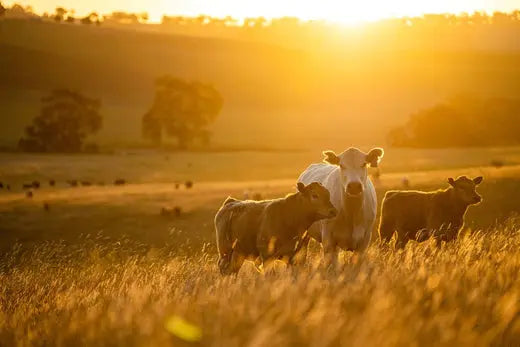From £6.99

Enhance Livestock Health and the Environment with Sustainable Farming
Caring for livestock in a sustainable manner is not just beneficial for the environment, but also enhances the health and productivity of your animals. By adopting eco-friendly methods, farmers and smallholders can contribute to a healthier planet while ensuring the well-being of their livestock. In this post, we'll explore some key sustainable farming practices such as rotational grazing, natural pasture management, and organic feed options.
Rotational Grazing
Rotational grazing is a practice that involves moving livestock between different pastures to allow forage plants to recover and regrow. This technique mimics natural grazing patterns found in the wild and provides numerous benefits for both the land and the animals. By frequently rotating pastures, you can prevent overgrazing, promote healthier root systems, and improve water retention in the soil.
Implementing rotational grazing reduces soil erosion and compaction, leading to richer, more fertile soil over time. For livestock, this means access to a constant supply of fresh, nutritious pasture, which can lead to improved health and weight gain. Planning a rotational grazing schedule can help you manage land resources more efficiently and ensure that each pasture remains productive throughout the year.
Natural Pasture Management
Utilizing natural pasture management techniques is another way to maintain biodiversity and enhance the resilience of your farm ecosystem. Techniques like inter-seeding, using native plant species, and avoiding synthetic fertilizers contribute to a healthy pasture environment. These practices support soil health, encourage beneficial insects, and reduce the need for chemical interventions.
By incorporating a diverse range of plant species into pastures, farmers can create a more balanced diet for their livestock. This diversity encourages animals to graze different plants, which can lead to improvements in digestion and overall health. Additionally, well-managed natural pastures can absorb carbon dioxide, mitigating the impact of climate change.
Organic Feed Options
Choosing organic feed options for your livestock is another impactful way to promote sustainability. Organic feeds are produced without the use of synthetic pesticides, fertilizers, or genetically modified organisms (GMOs). These feeds are often richer in nutrients and come from crops that have been grown following strict environmental standards.
When livestock is fed organic feed, it not only improves their health but also reduces the farm's overall environmental footprint. Organic farming practices support healthier soil and water systems, thus preserving local ecosystems. Moreover, opting for organic feed aligns with consumer demand for sustainably produced animal products, potentially increasing the marketability of your livestock products.
Benefits for the Environment and Livestock
The adoption of sustainable livestock care practices leads to a range of environmental benefits, including improved soil health, increased biodiversity, and reduced greenhouse gas emissions. Sustainable farming also encourages the conservation of natural resources, such as water, and supports the long-term productivity of the land.
For livestock, these eco-friendly practices result in better health, greater resistance to diseases, and often an improved quality of life. Animals raised in sustainable environments tend to have stronger immune systems and require fewer antibiotics and interventions, leading to more natural growth and development.
Conclusion
Sustainable farming practices for livestock care present an opportunity for farmers and smallholders to contribute positively to the environment while enhancing the welfare of their animals. By implementing rotational grazing, natural pasture management, and organic feed options, you can create a harmonious balance between your farm operations and the natural ecosystem. Embracing these methods not only benefits the environment but also aligns with consumer preferences for ethically and sustainably produced animal products, ensuring a better future for farming communities worldwide.
